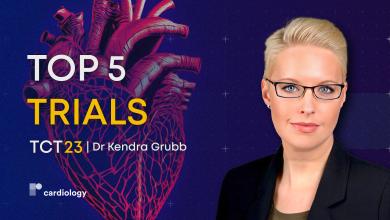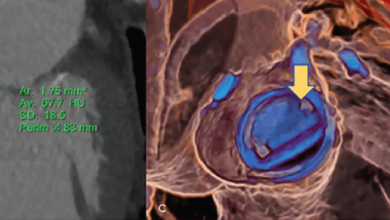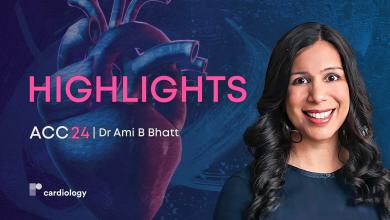Search results
TAVR Optimization
Author(s):
Saima Siddique
,
Resha Khanal
,
Amit N Vora
,
et al
Added:
2 years ago
Article
Author(s):
Kendra J Grubb
Added:
5 months ago
TCT 23 - We are joined by Dr Kendra Grubb (Emory School of Medicine, Atlanta, GA, US) for a concise and insightful summary of the late-breaking trials that are expected to have an impact on interventional science concerning structural heart disease and clinical practice.
Trials covered in detail include:
PARTNER 3 & EVOLUT Low-Risk
ALIGN-AR
TENDYNE
APOLLO
TRILUMINATE
Recorded remotely…
View more
Author(s):
Ahmed M Alabbady
,
Ahmed S Abdul-Al
,
Kimberly A Skelding
Added:
3 years ago
The introduction of percutaneous coronary angioplasty in 1977 by Dr Andreas Grüntzig1 was one of the most remarkable achievements in the cardiology realm, opening the door to numerous advancements in percutaneous coronary interventions (PCIs). Due to advances in PCI techniques over the past four decades, catheters along with four generations of coronary stents have dramatically changed the…
View more
Author(s):
Karthik Seetharam
,
Sirish Shrestha
,
Partho P Sengupta
Added:
3 years ago
Numerous advances in cardiovascular imaging technology paralleled by the simultaneous growth in wearable technology, mobile health devices, and electronic medical record integration have encouraged increasingly complex and large multi-dimensional data acquisition.1 The influx of data with each scan is exponentially rising in all cardiovascular imaging modalities and will exceed the capabilities…
View more
Author(s):
Usha Krishnan
Added:
3 years ago
Pediatric interventional cardiology was born 40 years ago in 1966, when William Rashkind developed balloon septostomy in neonates with transposition of the great arteries.1 Almost a decade later, Andreas Gruentzig developed coronary angioplasty (between 1972 and 1976), which heralded an explosive era of interventional therapy for adults with heart disease, overshadowing the advances in…
View more
Author(s):
Denton A Cooley
Added:
3 years ago
Innovative technologies and refinements of existing therapies are shaping 21st century cardiovascular diagnosis and treatment. Researchers are gaining new perspectives on diseases and their treatment at the cellular and subcellular levels. Cardiologists are evaluating and treating coronary arteries by means of intravascular intervention. Surgeons are shortening recovery times and increasing cost…
View more
Author(s):
Payam Pournazari
,
Su Min Chang
,
Stephen H Little
,
et al
Added:
1 year ago
Author(s):
Ami Bhatt
Added:
1 week ago
ACC 2024 — Dr Ami B Bhatt, Chief Innovation Officer of ACC, joins us to highlight key information regarding artificial intelligence innovations in cardiology in 2024.Dr Bhatt discusses the potential progress and innovation that artificial intelligence can provide in clinical medicine, including risk predictions, artificial intelligence use in EKGs, large language models and virtual learning…
View more
Author(s):
Mirvat Alasnag
,
Waqar Ahmed
,
Ibrahim Al-Nasser
,
et al
Added:
2 years ago
Author(s):
Nithima Chaowalit
,
Patricia A Pellikka
Added:
3 years ago
How Far Have We Come?
Cardiac imaging using ultrasound (so-called ‘echocardiography’) was introduced more than 50 years ago. Resting echocardiographic detection of myocardial infarction was described as the reduction in regional contractile function,1 and the development of stress echocardiography in the early era was recognised after the introduction of 2D echocardiographic imaging. The initial…
View more















 « First
« First